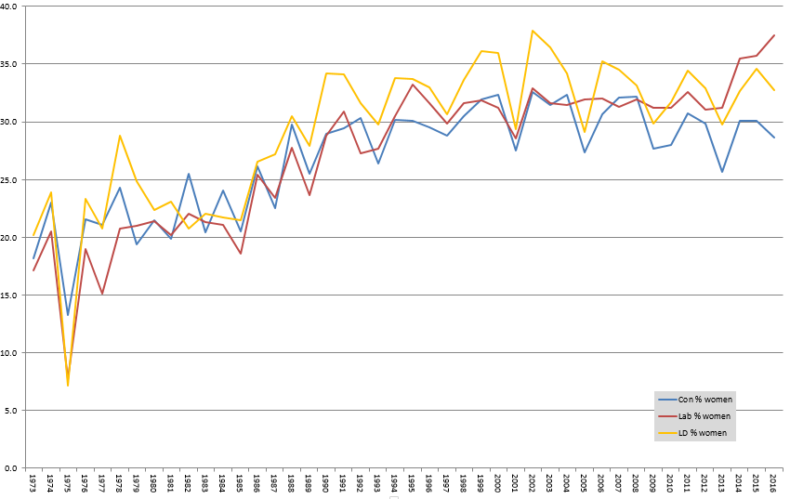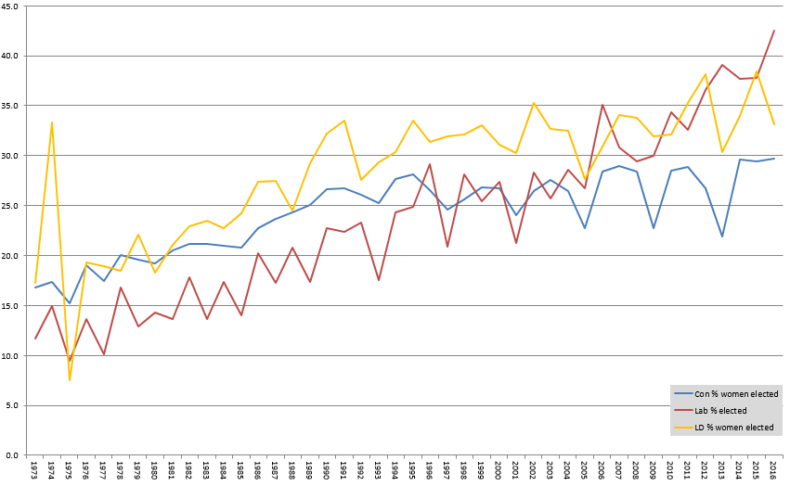Diversity in local elections: once again, no progress for Lib Dems
The proportion of Liberal Democrat local council candidates candidates who are female continued to flat-line in 2016 as it has now for nearly thirty years, becalmed at a level well short of the proportion of members who are female, the proportion of Liberal Democrat supporters who are female and the proportion of the electorate who are female.
Despite a promising little blip last year the overall picture, with variations through the four years local election cycle*, has been pretty simple: a long term upward trend for just under twenty years to a little over a third and then flat for the last near-thirty years.
While for many years the Liberal Democrat record was at least better than that of the other major parties, in the last few years the party has been overtaken by Labour – a gap that widened in 2016.
Female local election candidates in England

Female councillors elected in England

Why it matters
To update what I’ve said about these figures before, and the similar long-term patterns in Scotland and Wales:
- It is worth stressing the point as it almost never gets attention in the party, the brief exception aside: gender balance amongst the party’s local government base is stuck a long way short of the balance in the population. Although wider society has seen continuing trends towards gender equality, for the party and its predecessors the years of steady progress have been over for a quarter of a century. Society shows no signs of fixing the problem for the party.
- Is it a problem? With a majority of the population and a majority of the electorate being female, the question really is ‘do you think that we’re get the best individuals for the jobs when women make up over half the potential pool but under a third of the number of candidates?’ (And anyway, talking about the best person for the job misses the fact that we’re selecting teams, not just individuals.)
- Whatever the cause, it isn’t the party’s overall membership balance that is the cause, for the Lib Dem party is not that far short of being half female. Slightly less than the population overall, but way higher than the proportions of local councillors and candidates.
- It is possible to bring about big changes in a small number of years, as Labour has shown. That doesn’t mean Labour’s measures are ones Liberal Democrats should be comfortable with, but it does mean that leaving the numbers stalled isn’t inevitable; it’s a matter of choice.
- Gender is, of course, not the only diversity measure that matters and nor are male/female the only gender options. However I’ve concentrated on the gender question in this post and its predecessors as that’s the criteria for which detailed regular data is available. (If you’re aware of similar data runs covering other aspects of diversity, please do get in touch.)
Lib Dem gender balance in previous years
For my previous posts on the topic, some of which include data from outside England, see:
- 2015 Lib Dem gender balance
- 2014 Lib Dem gender balance
- 2013 Lib Dem gender balance
- 2010 Lib Dem gender balance
- 2009 Lib Dem gender balance
- 2008 Lib Dem gender balance
- 2007 Lib Dem gender balance
* As far as I know, no-one I has done detailed research into why some local government vacancies are more likely to result in female candidates than others, but most likely there are two explanations for this. First, if there is more than one vacancy in a ward at the same time – e.g. if all three seats in a multi-member ward are up for election in the same year – then local parties are more worried about standing three male candidates than if it is three separate vacancies in three different wards. Second, the working patterns of some councils – how far away the council offices are, when meetings are held, etc. – is likely to make it harder for people with greater family caring responsibilities, and that tends to hinder women more than men.
Thank you once to Colin Rallings and Michael Thrasher of The Elections Centre at the University of Plymouth and authors of British Electoral Facts 1832-2012 for providing the data used in this post.
Leave a Reply